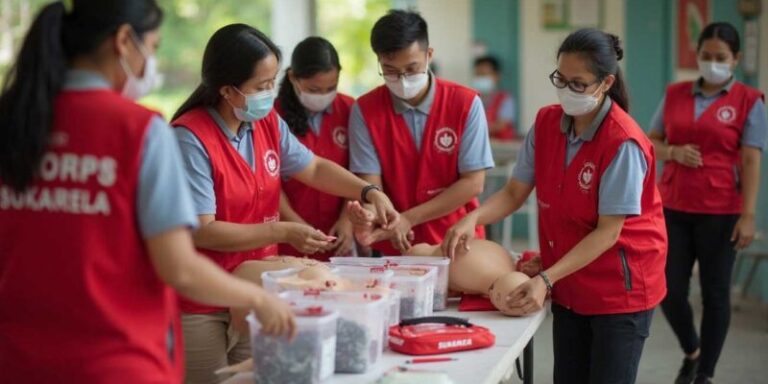Korps Sukarela, often referred to simply as KSR, is a volunteer corps established under the umbrella of the Indonesian Red Cross (Palang Merah Indonesia or PMI). Its mission is clear: to provide humanitarian assistance wherever it is needed, whether in times of natural disaster, emergency situations, or in everyday community service. Rooted in the values of compassion, solidarity, and service to humanity, Korps Sukarela plays a crucial role in bridging the gap between communities in need and the aid they require.
Unlike professional emergency services, members of KSR are ordinary individuals—students, workers, and local residents—who dedicate their time voluntarily. Their contributions demonstrate that a strong spirit of volunteerism can make a huge impact in society.
The Origins and Development of Korps Sukarela
The concept of volunteer corps in Indonesia began alongside the development of the PMI itself. As Indonesia faced numerous disasters such as earthquakes, tsunamis, and floods, it became evident that trained volunteers were necessary to respond effectively. Korps Sukarela emerged as a structured way to mobilize and prepare individuals for humanitarian missions.
Over time, KSR units were formed in various educational institutions, government offices, and local communities. Universities in particular became a strong base for KSR development, as students often embraced the values of social service and humanitarian action. Today, nearly every province in Indonesia has active KSR units that coordinate closely with PMI branches.
Roles and Responsibilities
Members of Korps Sukarela take on a wide variety of responsibilities depending on the situation. Their roles often include:
-
Disaster Response: Assisting in search and rescue, distributing aid, setting up evacuation shelters, and providing first aid during natural disasters.
-
Health Services: Supporting blood donation drives, conducting health campaigns, and educating the public on hygiene and disease prevention.
-
Community Empowerment: Running programs that promote disaster preparedness, resilience, and local capacity building.
-
Event Support: Offering first aid and crowd management during public gatherings, sports events, and cultural festivals.
Through these diverse tasks, KSR members gain not only practical skills but also valuable life experiences that shape their sense of responsibility and empathy.
Training and Preparedness
To be effective in their duties, Korps Sukarela members undergo structured training programs. These trainings cover areas such as first aid, disaster management, leadership, communication, and psychological support. In addition, members are taught the fundamental principles of the Red Cross and Red Crescent Movement, including neutrality, humanity, independence, and voluntary service.
Practical simulations are often part of the training, where volunteers practice responding to mock disaster scenarios. These exercises ensure that members are prepared for the unexpected challenges they may face in real-life situations.
The Spirit of Volunteerism
At the heart of Korps Sukarela is the spirit of volunteerism. Members are not paid for their service; instead, they are driven by a deep sense of empathy and a desire to help others. This mindset fosters solidarity among individuals from diverse backgrounds, uniting them in a common purpose.
Volunteerism also promotes personal growth. Many KSR members report that their involvement has improved their leadership skills, confidence, and ability to work in a team. For young people in particular, joining KSR is both a noble way to serve the community and an opportunity for self-development.
Challenges Faced by Korps Sukarela
Despite its strengths, Korps Sukarela also faces several challenges. Limited funding and resources sometimes hinder the scope of their activities. Volunteers may lack access to modern equipment or transportation during large-scale disasters. In addition, balancing volunteer work with academic or professional commitments can be difficult for many members.
However, these challenges often strengthen the resolve of KSR. By working creatively and relying on teamwork, members manage to overcome obstacles and continue their humanitarian mission.
Impact on Communities
The presence of Korps Sukarela has left a lasting impact on Indonesian society. In times of disaster, KSR members are often among the first to arrive, providing immediate relief and comfort. Their involvement in health and education programs has also raised awareness on crucial issues such as blood donation, disaster preparedness, and public hygiene.
Most importantly, KSR inspires communities to take part in humanitarian work themselves. By witnessing the dedication of volunteers, many individuals are encouraged to contribute in whatever ways they can, whether by donating blood, providing supplies, or simply offering moral support.
Conclusion
Korps Sukarela stands as a shining example of how ordinary people can make extraordinary contributions to society. With their commitment, courage, and compassion, members of KSR embody the values of humanity and solidarity. While challenges remain, the impact they have on communities proves that volunteerism is a powerful force for change.
As Indonesia continues to face both natural and social challenges, the role of Korps Sukarela will remain vital. Their story reminds us that helping others is not only an act of kindness but also a responsibility that strengthens the very fabric of society.
